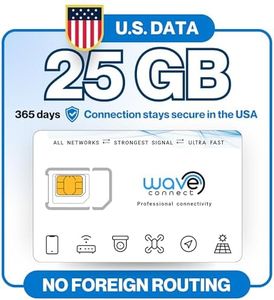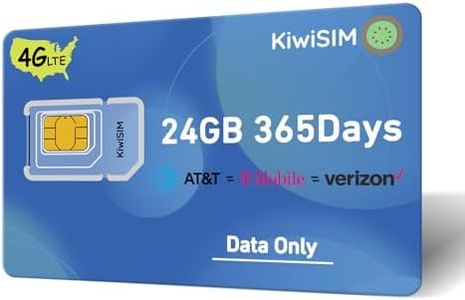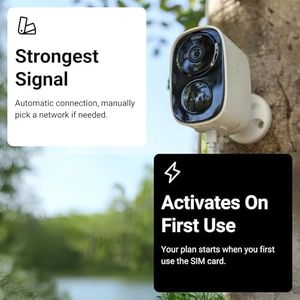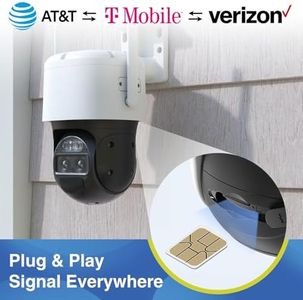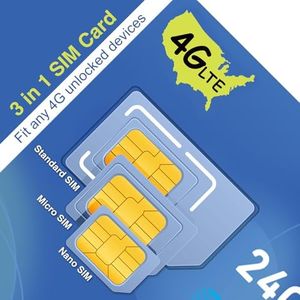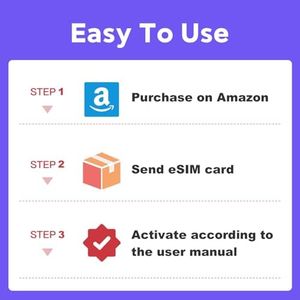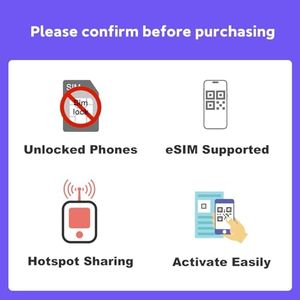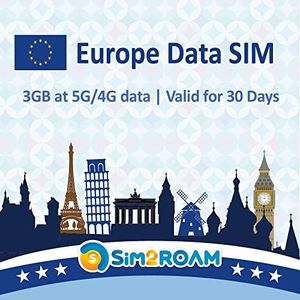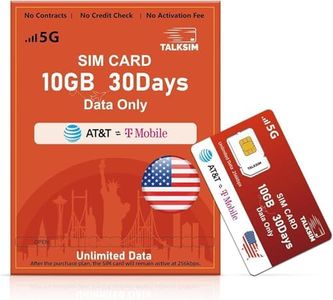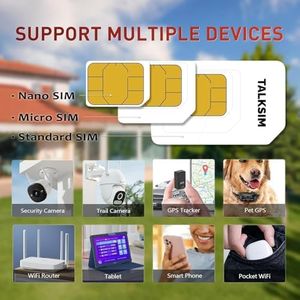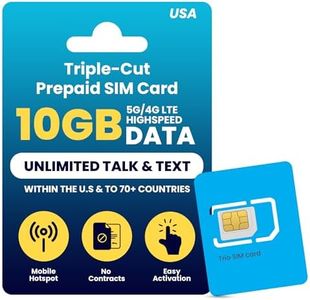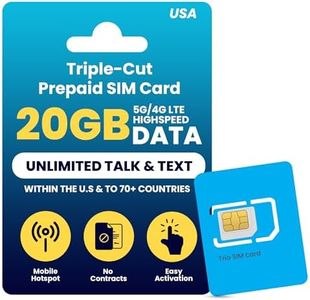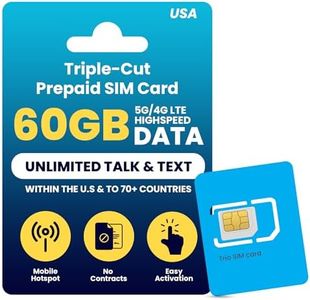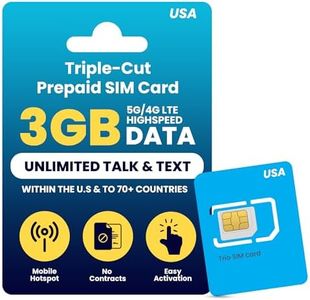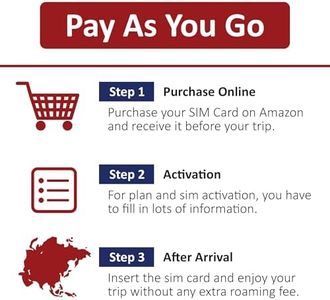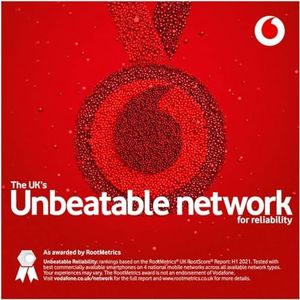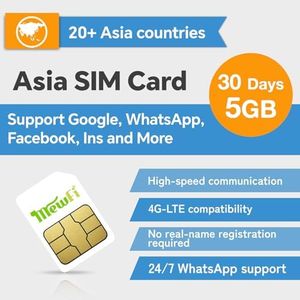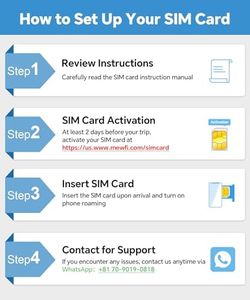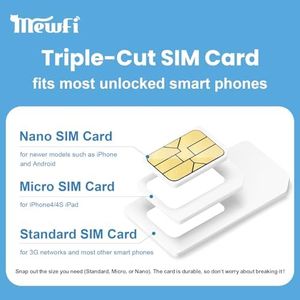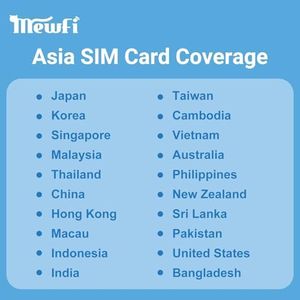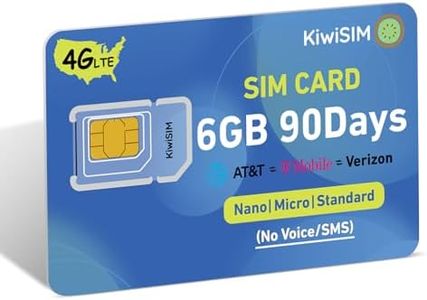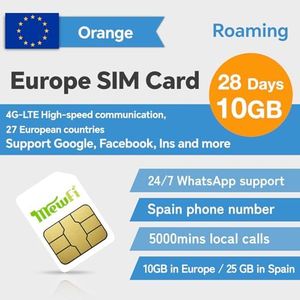10 Best International Data Sim Card 2025 in the United States
Winner
Zero Foreign Routing Quad Network USA SIM Card, 25GB/365 Days, 4G & 5G on Verizon, US Cellular, T Mobile & ATT, Data Only
The Zero Foreign Routing Quad Network USA SIM Card offers a solid data plan with 25GB of data valid for a whole year, making it an excellent option for users who need long-term connectivity while traveling in the U.S. The SIM card operates on multiple major U.S. networks, including Verizon, T-Mobile, AT&T, and US Cellular, ensuring extensive coverage and reliable 4G and 5G speeds. This means you can expect good performance in most areas across the country.
Most important from
98 reviews
Data SIM Card 24GB 365Days, 4G LTE SIM Card Support for AT&T, T-Mobile and Verizon, USA SIM Card for Security Camera/Router/Mobile WiFi Hotspot, No Contract, 3-in-1 Sim Kit(Activate Needed)
The KiwiSIM Data SIM Card offers 24GB of data valid for 365 days, making it a convenient option for extended use without frequent top-ups. This SIM card stands out with its extensive coverage and reliable signal, leveraging the networks of AT&T, T-Mobile, and Verizon to ensure nationwide 4G LTE access. This is particularly beneficial for users who need consistent internet access across various locations in the USA.
Most important from
42 reviews
Europe eSIM Prepaid 10GB Data for 15 Days, 4G LTE High-Speed Network for Unlocked iPhone and Android, Supports European 30+ Countries, Data Tethering Allowed, No Contract No SIM Card
The Europe eSIM Card offers a generous 10GB data allowance valid for 15 days, making it an ideal choice for short-term travelers or business professionals visiting Europe. Covering 31 countries, including the UK and Norway, it provides extensive coverage on a reliable 4G LTE network. This ensures you have fast and dependable internet access while traveling, and the capability to share your connection via a mobile hotspot enhances its utility.
Most important from
22 reviews
Top 10 Best International Data Sim Card 2025 in the United States
Winner
Zero Foreign Routing Quad Network USA SIM Card, 25GB/365 Days, 4G & 5G on Verizon, US Cellular, T Mobile & ATT, Data Only
Zero Foreign Routing Quad Network USA SIM Card, 25GB/365 Days, 4G & 5G on Verizon, US Cellular, T Mobile & ATT, Data Only
Chosen by 1240 this week
Data SIM Card 24GB 365Days, 4G LTE SIM Card Support for AT&T, T-Mobile and Verizon, USA SIM Card for Security Camera/Router/Mobile WiFi Hotspot, No Contract, 3-in-1 Sim Kit(Activate Needed)
Data SIM Card 24GB 365Days, 4G LTE SIM Card Support for AT&T, T-Mobile and Verizon, USA SIM Card for Security Camera/Router/Mobile WiFi Hotspot, No Contract, 3-in-1 Sim Kit(Activate Needed)
Europe eSIM Prepaid 10GB Data for 15 Days, 4G LTE High-Speed Network for Unlocked iPhone and Android, Supports European 30+ Countries, Data Tethering Allowed, No Contract No SIM Card
Europe eSIM Prepaid 10GB Data for 15 Days, 4G LTE High-Speed Network for Unlocked iPhone and Android, Supports European 30+ Countries, Data Tethering Allowed, No Contract No SIM Card
TALKSIM USA Unlimited Data Only SIM Card for AT&T/T-Mobile 5G/4G LTE - 10GB 30Days Prepaid SIM Card for Unlocked Security Camera/Router/Mobile WiFi Hotspot/GPS Tracker/Tablet iot Devices
TALKSIM USA Unlimited Data Only SIM Card for AT&T/T-Mobile 5G/4G LTE - 10GB 30Days Prepaid SIM Card for Unlocked Security Camera/Router/Mobile WiFi Hotspot/GPS Tracker/Tablet iot Devices
KiwiSIM 6GB 90Days SIM Data Card USA, 4G LTE SIM Card Support for AT&T, T-Mobile and Verizon, SIM Card for Unlocked loT Devices, SIM Card for Security Camera/Router/Hospot WiFi, 3-in-1 SIM Kit
KiwiSIM 6GB 90Days SIM Data Card USA, 4G LTE SIM Card Support for AT&T, T-Mobile and Verizon, SIM Card for Unlocked loT Devices, SIM Card for Security Camera/Router/Hospot WiFi, 3-in-1 SIM Kit
Recommended lists
Our technology thoroughly searches through the online shopping world, reviewing hundreds of sites. We then process and analyze this information, updating in real-time to bring you the latest top-rated products. This way, you always get the best and most current options available.

